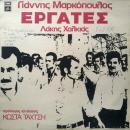- Αγρίμια κι αγριμάκια μου,
λάφια μου μερωμένα,
πέστε μου πού'ναι οι τόποι σας,
πού'ναι τα χειμαδιά σας;
- Γκρεμνά'ναι εμάς οι τόποι μας,
λέσκες τα χειμαδιά μας,
τα σπηλιαράκια του βουνού
είναι τα γονικά μας.
λάφια μου μερωμένα,
πέστε μου πού'ναι οι τόποι σας,
πού'ναι τα χειμαδιά σας;
- Γκρεμνά'ναι εμάς οι τόποι μας,
λέσκες τα χειμαδιά μας,
τα σπηλιαράκια του βουνού
είναι τα γονικά μας.
Contributed by Riccardo Venturi - 2007/4/15 - 01:15
Language: Greek (Modern)
Trascrizione fonetica con assecuzione del canto
[ a'γrimña kj.aγri'makja."mu
a'γrimña kj.aγri'makja."mu
'lafja.na "la'fja.mu … me :::
me..ro'mena.na ::: me'romena …pe'ste.mu
pu::: pu.nj.i.'to:::pe'ste.mu
"pu.n.i.'topi"sas
- chorus –
a'γrimña kj.aγri'makja."mu
a'γrimña kj.aγri'makja."mu
'lafja.na "la'fja.mu … me :::
me..ro'mena.na ::: me'romena …pe'ste.mu
pu::: pu.nj.i.'to:::pe'ste.mu
"pu.n.i.'topi"sas
"pe'ste.mu "pu.nj.i.'topi"sa:::s
"pe'ste.mu "pu.nj.i.'topi"sa:::s
"kje.'pu.na … "kje.'pu ::: ta …
'çi:::'çi::ma::"δja.sas …
ta'çi::ma::"δja.sas … gre'mna.. ne'mas
'mas.i.'to:::gre'mna..ne'mas.i.'topi"mas
- musical phrase –
gre'mna..ne'mas.i.'topi"mas
gre'mna..ne'mas.i.'topi"mas
le'skjes.na … le'skjes.ta.'çi :::
"çi..ma..'δja.mas …ta"çi...ma..'δja'mas …ta'spi:lja :::
…'rakja.tu ::: ta.spi:lja'rakja tu.vu'nu
- musical phrase –
ta.spi:lja'rakja tu.vu'nu
ta.spi:lja'rakja tu.vu'nu :::
'ine.na :: 'ine ..ta'γo :::
γo::nji'ka.mas :: ta"γo:nji'ka.mas . a'γri:mnja
"kj'aγri'ma ::: a'γri:mnja kj'aγri'makja.mu :::
- coda - ]
a'γrimña kj.aγri'makja."mu
'lafja.na "la'fja.mu … me :::
me..ro'mena.na ::: me'romena …pe'ste.mu
pu::: pu.nj.i.'to:::pe'ste.mu
"pu.n.i.'topi"sas
- chorus –
a'γrimña kj.aγri'makja."mu
a'γrimña kj.aγri'makja."mu
'lafja.na "la'fja.mu … me :::
me..ro'mena.na ::: me'romena …pe'ste.mu
pu::: pu.nj.i.'to:::pe'ste.mu
"pu.n.i.'topi"sas
"pe'ste.mu "pu.nj.i.'topi"sa:::s
"pe'ste.mu "pu.nj.i.'topi"sa:::s
"kje.'pu.na … "kje.'pu ::: ta …
'çi:::'çi::ma::"δja.sas …
ta'çi::ma::"δja.sas … gre'mna.. ne'mas
'mas.i.'to:::gre'mna..ne'mas.i.'topi"mas
- musical phrase –
gre'mna..ne'mas.i.'topi"mas
gre'mna..ne'mas.i.'topi"mas
le'skjes.na … le'skjes.ta.'çi :::
"çi..ma..'δja.mas …ta"çi...ma..'δja'mas …ta'spi:lja :::
…'rakja.tu ::: ta.spi:lja'rakja tu.vu'nu
- musical phrase –
ta.spi:lja'rakja tu.vu'nu
ta.spi:lja'rakja tu.vu'nu :::
'ine.na :: 'ine ..ta'γo :::
γo::nji'ka.mas :: ta"γo:nji'ka.mas . a'γri:mnja
"kj'aγri'ma ::: a'γri:mnja kj'aγri'makja.mu :::
- coda - ]
Language: Italian
Versione italiana di Riccardo Venturi
15 aprile 2007
15 aprile 2007
Language: English
MY WILDINGS AND LITTLE WILDINGS
- My wildings and little wildings,
my tamed deer,
tell me, where are your lands
and where your winter quarters?
- Cliffs are our lands,
leskes* are our winter quarters,
the little caves of the mountain
are our parents.
- My wildings and little wildings,
my tamed deer,
tell me, where are your lands
and where your winter quarters?
- Cliffs are our lands,
leskes* are our winter quarters,
the little caves of the mountain
are our parents.
* leskes (sing. leska) = an old cretan type of small house, which consists of a single room where the fireplace, the wine - press, the fire trivet. Leskes where used by wanderers, such as shepherds, but mostly by mountain partisans during the Ottoman rule.
The song, sung by Cretans during the period of Turkish domination, refers to the partisans that used to live in the mountains and fight for the freedom of their land.
The song, sung by Cretans during the period of Turkish domination, refers to the partisans that used to live in the mountains and fight for the freedom of their land.
Contributed by Riccardo Venturi - 2008/9/17 - 23:23
Language: Danish
Dansk oversættelse fra denne side
Versione danese da questa pagina (danese dedicata alla cultura cretese)
Versione danese da questa pagina (danese dedicata alla cultura cretese)
I VILDE GEDER OG GEDEKID
- I vilde geder og gedekid,
I tæmmede hjorte,
sig mig, hvor I holder til,
og hvor I er om vinteren.
- I slugterne vi holder til,
på stejle toppe vi har vinterhi,
or kun i bjergets huler
føler vi os hjemme.
- I vilde geder og gedekid,
I tæmmede hjorte,
sig mig, hvor I holder til,
og hvor I er om vinteren.
- I slugterne vi holder til,
på stejle toppe vi har vinterhi,
or kun i bjergets huler
føler vi os hjemme.
Contributed by Riccardo Venturi - 2007/4/15 - 01:47
Language: Serbian
DIVLJAČI MOJE I DIVLJE ŽIVOTINJICE
Divljači moje i divlje životinjice
jeleni moji pitomi
kažite mi gde su vaši krajevi
gde boravite zimi
Opustošeni su naši krajevi
zimujemo u kolibama
pećine u planini
naša su porodica
Divljači moje i divlje životinjice
jeleni moji pitomi
kažite mi gde su vaši krajevi
gde boravite zimi
Opustošeni su naši krajevi
zimujemo u kolibama
pećine u planini
naša su porodica
Contributed by Riccardo Venturi - 2008/9/17 - 23:26
×
![]()
Note for non-Italian users: Sorry, though the interface of this website is translated into English, most commentaries and biographies are in Italian and/or in other languages like French, German, Spanish, Russian etc.







Παραδοσιακό
Tradizionale cretese
Προσαρμογή και ενορχέστρωση του Γιάννη Μαρκόπουλου
Ερμηνεία του Νίκου Ξυλούρη
'Αλμπουμ: Ριζίτικα [1971]
Arrangiamento e orchestrazione di Yannis Markopoulos
Interpretazione di Nikos Xylouris
Album: Rizitika [1971]
La comprensione di questa canzone non può essere separata dal video in cui Nikos Xylouris la canta e la spiega. Un video che, prima che compaia Xylouris, si apre con dei cittadini e cittadini greci, fatti salire su un cellulare il 21 aprile 1967 e portati via dai militari, mentre gente che passa su un autobus li guarda con facce terrorizzate. Questo splendido canto tradizionale è, come tutti i rizitika cretesi, di cui "Psaronikos" Xylouris fu massimo interprete, un canto di lotta per la libertà. Logico che la dittatura militare li proibisse in massa. Risale probabilmente anch'esso alla lotta di indipendenza del 1821: i canti di questa guerra hanno accompagnato i greci in tutte le loro lotte. Un canto dove ai "cervi ammansiti", alle "bestie selvatiche", si chiede dove siano i luoghi dove stanno. E le bestie, selvatiche e addomesticate, rispondono fieramente: sono sui dirupi, sono nelle grotte, sulle alte cime. Tutti i posti dove si rifugia chi lotta per la libertà. Durante la turcocrazia, ovviamente, la metafora era l'unico modo per dire certe cose chiaramente, in modo che da tutti potessero essere comprese. Una cosa che si è ripetuta spesso nella storia cretese e greca. "I rizitika", dice Xylouris nel video, "sono canti di osteria e di banchetti di nozze, di gioia e di dolore, che il popolo cretese cantava negli anni della sua schiavitù. Αγρίμια κι αγριμάκια μου dice alle bestie ammansite e ai cervi che il loro posto è a lottare per la libertà." Le "bestie selvatiche" sono i partigiani cretesi, i chainides che lottavano contro i turchi. La canzone dura assai di più di quel che il breve testo potrebbe far supporre. I suoi versi sono ripetuti in un intreccio continuo, con una tecnica di canto assai complicata e particolare. Interviene anche un coro (si veda la trascrizione fonetica con assecuzione del canto, assolutamente necessaria per seguire il testo). [RV]
Yannis Markopoulos
Nikos Xylouris
Nel 1971 il genio di Yannis Markopoulos incontrò Nikos Xylouris, che del rizitiko, il canto tradizionale cretese delle “pendici” (ρίζες) delle alte montagne, era il massimo interprete vivente con la sua lira. Ne nacque un album storico, e non solo a Creta o in Grecia.
L'intero album
01. Πότε θα κάνει ξαστεριά
02. Ίντα ’χετε γύρου γύρου
03. Αγρίμια κι αγριμάκια μου
04. Μάνα κι αν έρθουν οι φίλοι μου
05. Ο χορός του Σήφακα
06. Από την άκρη των ακριώ
07. Κόσμε χρυσέ
08. Σε ψηλό βουνό (O αητός)
09. Ο Διγενής
10. Τον πλούσιο Γιώργη ήβρηκα [Ο Πλουσιογιώργης]
11. Μαδάρα [Κρητικό κανάλι]